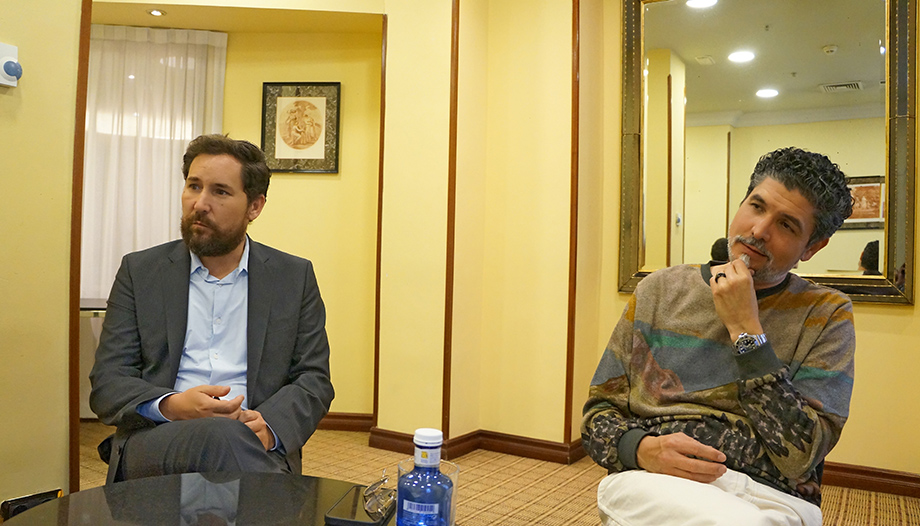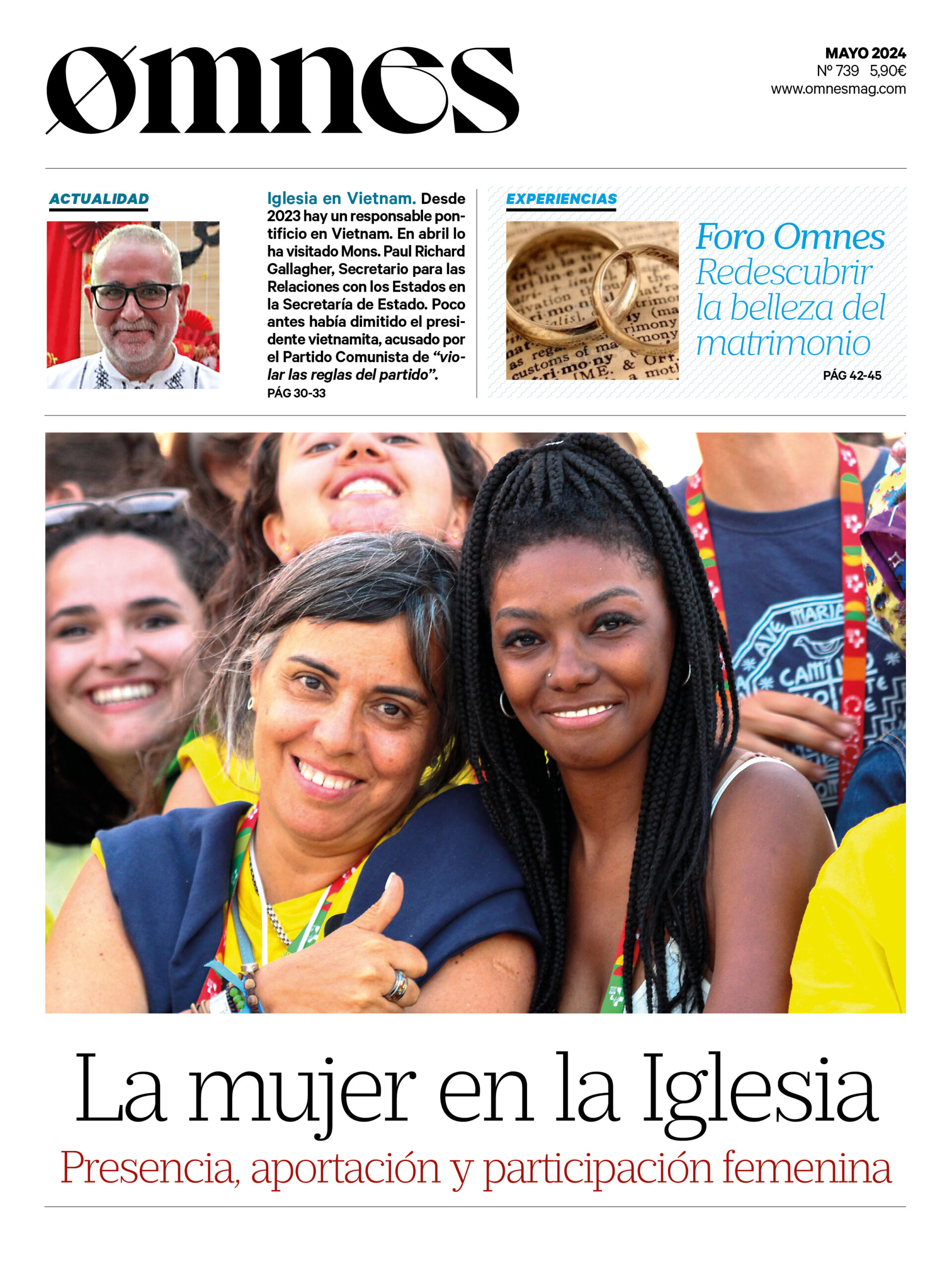We chatted with Alejandro Monteverde, director of the film, and Javier Godino, who plays Jorge, a Colombian policeman, in Madrid. Sound of Freedom, a film that addresses the terrible reality of underage sex trafficking arrives at Spanish box offices, thanks to a contracorriente films after being the No. 1 independent film in the United States.
Despite not being endorsed by the big industry, this brave film, starring Jim Caviezel ("The Passion of the Christ"), Mira Sorvino ("Mighty Aphrodite"), Eduardo Verástegui: and Javier Godino has surpassed $150 million in its first three weeks of theatrical release.
Sound of Freedom,(Sound of Freedom) tells the story of Tim Ballard, a former U.S. Homeland Security agent who gave up everything to fight against child trafficking. Through a moving and, at the same time, horrifying story, the viewer enters into this terrible scourge but with the light of hope to make, with this film, a turning point in the collective and personal awareness of this reality.
Alejandro, how did Tim Ballard's story come to your attention?
-I had been writing a fiction about this issue of child trafficking for about three months. At that time, the producer (Eduardo Verástegui) asked me if I wanted to meet Tim Ballard. I looked for information about him and realized he was an expert on the subject, who had worked for the federal government. I thought it would be great to talk to him as part of the research, but when I met him, I realized that his life surpassed the fiction I had been writing for three months. We made a change of route and started writing his life as a screenplay.
As a director, what made you take that step?
-What struck me most was what made him leave his children to go rescue other people's children. To leave your family, your job, your economic security..., everything, to go to rescue children who are not Americans. In the USA there is a lot of patriotism and I admire it. Ballard is an American agent, of the government and his first mission was to rescue Colombian children, or rather, children in Colombia from all over Latin America, Central America and South America.
In addition to this, I was very struck by how he began to bring together this group, of various nationalities, for example, with the character Jorge, played by Javier Godino.
Ballard once told me that children should have no nationality. That is, they should be protected, literally, by the whole world. If a child is raped in Haiti it should be the responsibility of the whole world; that protection is for the whales, but not for the children? For Ballard, children are the heart of the world and if we don't protect the heart, we can go into cardiac arrest.
To manage this Sound of Freedom has touched you internally?
-Yes, I think so for me and for all of us who worked on the film. It's a very complex subject that we have avoided for a long time. It's not something new, historically we have been in this darkness for a long time.
The simple fact of shining a light on this darkness and creating a space to start a social conversation already begins to change you. But more than anything else, I am impressed by the number of victims who open up after seeing the film. It has happened to me in every presentation that at least one or two victims feel the confidence to share their story with me. I always tell them, "I'd like to help you, but I'm not a psychologist, not an expert on the subject... But I do appreciate that you have the courage to tell it, to talk about it. If this film inspired you to do that, go for it. The latter, this conversation, is a job that I don't do, it has to be done in community.
How do you make a film about such a tough subject that you can watch without fear?
-For me, child abuse is a problem that is not a problem of one country, nor of one age. It is a situation that we all have to take action against. So how do you make a film about such a strong subject that the whole family can see? The answer, in my opinion, is that it is cinema. Cinema can be enjoyed if the film uses poetic elements to describe a darkness, without you having to see something that you will later regret having seen.
Was it difficult not to fall into "exhibitionism"?
- [Alejandro Monteverde] It was an intense process. First, about the script: It's cheaper to fix a scene on paper than on film. First we started testing the script, making it as descriptive as we could: Those scenes where the curtain closes, we stand outside "waiting", and you hear the dogs barking... Some of them came back to me. It was two years of working on the script and, once they worked on paper, we went to shoot.
Also while shooting there were moments that were very strong in camera and I would say "Stop, let's change this", a camera adjustment, a position..., because we were very conscious of that thin line, that we should not cross.
- [Javier Godino] The journey is internal within the viewer. It is as in Shark Spielberg, you are afraid of a shark of which you only see a fin..., you imagine it. It is the spectator who makes the internal journey.
Sound of Freedom provokes tears in more than one viewer. Did you cry while watching the movie?
- [Javier Godino] I did. I saw it recently, once it was finished. We made this film in 2018 and, watching it, there are touching moments, others very hard. We are at a time when many of us know victims of abuse and it stirred a lot of things inside me. I had that inner journey I was talking about before. But I also had tears of hope with that "Do you hear this? It's the sound of freedom."At that moment I got excited. That is cinema.
Why did it take so long to get this project off the ground?
- [Alejandro Monteverde] It was a combination of factors. The first is the challenge of selling this film to the audience. This was the biggest challenge for distributors, when they heard the subject matter. Cinema was already in a slump before the pandemic. I remember reading an article at the time in which Spielberg talked about how movies were going to become a Broadway experience, something you do once or twice a year, at most. The movies that were coming into theaters were huge movies, independent cinema was disappearing....
Thinking out loud, I don't remember another independent film that has been this successful since the movie business started going down. If people were going to pay $15 to see a movie they wanted a $200 million production, not a $2 million film....
I hope this film will be a watershed, that it will show that there is an audience for independent films...
- [Javier Godino] ...and for these tough topics.
Javier, your character is an "air of hope" in a contrary atmosphere. How have you experienced playing Jorge?
- [Javier Godino] With a lot of responsibility.
Telling the story of a policeman who manages to move a whole police machinery in Colombia to rescue these children is something I have lived with a lot of responsibility and with a lot of gratitude, too.
I've done many darker characters: rapists, murderers..., and it hurts a lot to do those characters because, somehow, it gets a little "stuck" in your body. People look at you through that prism.
Suddenly, playing the hero, it's beautiful! It's equally hard, because in filmmaking you put your emotions on the line all the time and for three months you have to sustain those emotions and those images that the film brings.
I live it with joy and seeing the success I think how good it is that we are achieving a dialogue in society! It is true that we are at a time when many abuses are being uncovered, abuses ..... We have to keep talking about it and we have to clean up a lot.
How do you think it will be received in Spain?
- [Javier Godino] I think the public will recommend it because it is a film in which you see a reality, but you see it well, with hope. I think it will be a success.












